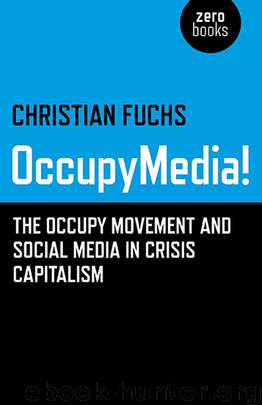OccupyMedia! by Christian Fuchs

Author:Christian Fuchs [Fuchs, Christian]
Language: eng
Format: epub
ISBN: 978-1-78279-405-9
Publisher: John Hunt Publishing
Published: 2014-09-25T16:00:00+00:00
Table 22: Frequency of usage per month of specific forms of communication in the mobilization of protest
Table 23: Frequency of usage per month of specific forms of communication in the mobilization of protest
The data indicates that face-to-face communication, Facebook, email, phone, SMS and Twitter are the most important media that Occupy activists employ for trying to mobilize others for protests. Activists use multiple media for mobilization-oriented communication. These include classical interpersonal communication via phones, email, face-to-face and private social media profiles as well as more public forms of communication such as Facebook groups, Twitter and email lists. Posting announcements on alternative social media is much more uncommon than doing the same on Twitter and Facebook: Whereas 42% of the respondents posted protest announcements frequently on their Facebook profiles, only 4.4% did so on Occupii, 3.1% on N-1 and 1.1% on Diaspora*. 25.8% frequently posted protest announcements on their friends’ Facebook profiles, whereas only 1.3% did so on Occupii, 2.2% on N-1 and 0.8% on Diaspora*. 35.6% frequently posted protest announcements on Occupy pages/groups on Facebook, 3.7% on Occupii, 2.5% on N-1, 1.1% on Diaspora*. The data indicates that the big corporate social media are more attractive for activists in mobilization communication. The reason could be that these platforms have a large number of users and that the activists have a relatively large contact network there, whereas alternative social media are not used that much and as a consequence tend to feature smaller contact networks. Although there are various forms of protest mobilization communication, one should not overestimate this form of communication. There is a significant share of respondents who did not engage in mobilization communication: 29.8% of the respondents never sent mobilization messages via email, 36.9% never did the same via the phone, 49.7% never via SMS, 46.2% never via email lists, 44.0% never posted announcement on Facebook groups, 53.1% never wrote such messages on Facebook profiles of their friends, 52.0% never used Twitter for this purpose. There is a significantly large share of activists who engage in protest mobilization communication, but this type of communication is, although fairly common, not common to all activists.
I also conducted a correlation analysis of the variables that cover protest mobilization communication. Some of the correlation results are presented in Table 24.
Download
This site does not store any files on its server. We only index and link to content provided by other sites. Please contact the content providers to delete copyright contents if any and email us, we'll remove relevant links or contents immediately.
The Secret History by Donna Tartt(19097)
The Social Justice Warrior Handbook by Lisa De Pasquale(12193)
Thirteen Reasons Why by Jay Asher(8915)
This Is How You Lose Her by Junot Diaz(6891)
Weapons of Math Destruction by Cathy O'Neil(6283)
Zero to One by Peter Thiel(5805)
Beartown by Fredrik Backman(5763)
The Myth of the Strong Leader by Archie Brown(5511)
The Fire Next Time by James Baldwin(5452)
How Democracies Die by Steven Levitsky & Daniel Ziblatt(5221)
Promise Me, Dad by Joe Biden(5155)
Stone's Rules by Roger Stone(5089)
A Higher Loyalty: Truth, Lies, and Leadership by James Comey(4965)
100 Deadly Skills by Clint Emerson(4929)
Rise and Kill First by Ronen Bergman(4792)
Secrecy World by Jake Bernstein(4755)
The David Icke Guide to the Global Conspiracy (and how to end it) by David Icke(4721)
The Farm by Tom Rob Smith(4516)
The Doomsday Machine by Daniel Ellsberg(4492)
